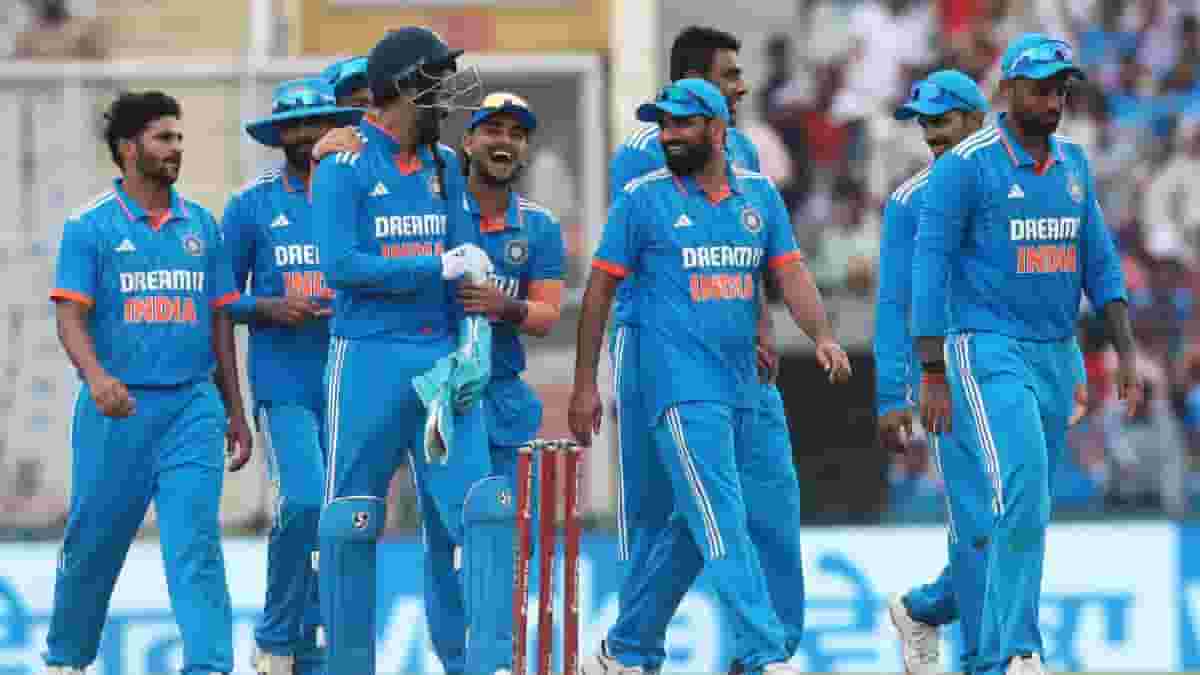
As one arrives in New Delhi, they encounter brisk mornings followed by sunny days and cool evenings, as the city experiences its first taste of changing weather in October as the monsoon retreats. Amidst this shifting backdrop, the Indian cricket team, sans the unwell Shubman Gill, has its sights set on adding another victory to its tally as they take on Afghanistan in the 2023 Men’s ODI World Cup. The clash is scheduled to unfold at the revamped Arun Jaitley Stadium on Wednesday, expected to witness an overwhelming presence of blue-clad supporters.
The previous match at this venue during the tournament witnessed a sensational high-scoring contest between South Africa and Sri Lanka, where a staggering 754 runs were amassed in 94.5 overs. This marked the highest-ever run aggregate in an ODI World Cup match, including a remarkable 31 sixes. With the stadium’s compact boundaries and a speedy outfield, spectators can anticipate another run-fest on the pitch being used for the first time in the competition.
Although India enters the tournament on the back of a convincing six-wicket victory over Australia in Chennai, they recognize that Afghanistan presents a formidable challenge. Additionally, the transition from Chennai to Delhi brings a change in conditions and pitches, testing India’s ability to adapt swiftly.
Also Read: ODI World Cup 2023: England defeat Bangladesh by 137 runs
The team’s batting trio, consisting of Captain Rohit Sharma, Ishan Kishan, and Shreyas Iyer, will aim to make amends after consecutive ducks against Australia. India will also closely monitor Kishan and Iyer’s shot selection to prevent rash strokes that led to their dismissals in Chennai.
One aspect that pleased India was the resilient partnership between Virat Kohli and KL Rahul, who weathered the early storm to share a match-winning 165-run stand. Kohli, renowned for his chasing prowess, added another successful chase to his resume, while Rahul showcased his ability as a composed middle-order batsman capable of handling pressure situations.
From a bowling perspective, all Indian bowlers contributed wickets in Chennai. However, with conditions in New Delhi differing significantly, India may contemplate including a fast bowler like Mohammad Shami or a batting all-rounder such as Shardul Thakur, possibly in place of the experienced off-spinner Ravichandran Ashwin.
In head-to-head ODI encounters, India holds a 2-0 advantage over Afghanistan, including a thrilling tied match in the 2018 Asia Cup. Their last encounter in the 2019 World Cup saw India secure a narrow 11-run win, thanks to Mohammed Shami’s hat-trick in Southampton. However, Afghanistan recently achieved something India hasn’t in a while—an ODI series victory in Bangladesh.
Yet, Afghanistan’s recent game against Bangladesh ended in a disappointing defeat. Despite a strong start at 83-1, Afghanistan slumped to 156 all out, primarily due to the spin wizardry of Shakib Al Hasan and Mehidy Hasan Miraz. In New Delhi, Afghanistan will aim to put up a more resilient batting display to break their six-match losing streak, especially when facing India’s formidable spin bowling attack.
Hashmatullah Shahidi, Afghanistan’s captain, expressed confidence in his team’s ability to handle spin, given their daily practice sessions against quality spinners like Rashid Khan, Mohammad Nabi, Noor Ahmad, and Mujeeb Ur Rahman. Afghanistan’s opening batsman, Rahmanullah Gurbaz, will be a key figure at the top. The team will rely on their spin trio, Rashid Khan, Mohammad Nabi, and Mujeeb Ur Rahman, along with fast bowlers Fazalhaq Farooqui and Naveen-ul-Haq, to challenge the Indian batters in a stadium draped in blue and experiencing unpredictable weather.
Squads:
India: Rohit Sharma (captain), Hardik Pandya (vice-captain), Shubman Gill, Virat Kohli, Shreyas Iyer, KL Rahul (wicket-keeper), Ravindra Jadeja, Shardul Thakur, Jasprit Bumrah, Mohammed Siraj, Kuldeep Yadav, Mohammed Shami, Ravichandran Ashwin, Ishan Kishan, and Suryakumar Yadav.
Afghanistan: Hashmatullah Shahidi (captain), Rahmanullah Gurbaz (wicket-keeper), Ibrahim Zadran, Riaz Hassan, Rahmat Shah, Najibullah Zadran, Mohammad Nabi, Ikram Alikhil, Azmatullah Omarzai, Rashid Khan, Mujeeb ur Rahman, Noor Ahmad, Fazalhaq Farooqi, Abdul Rahman, and Naveen ul Haq.




